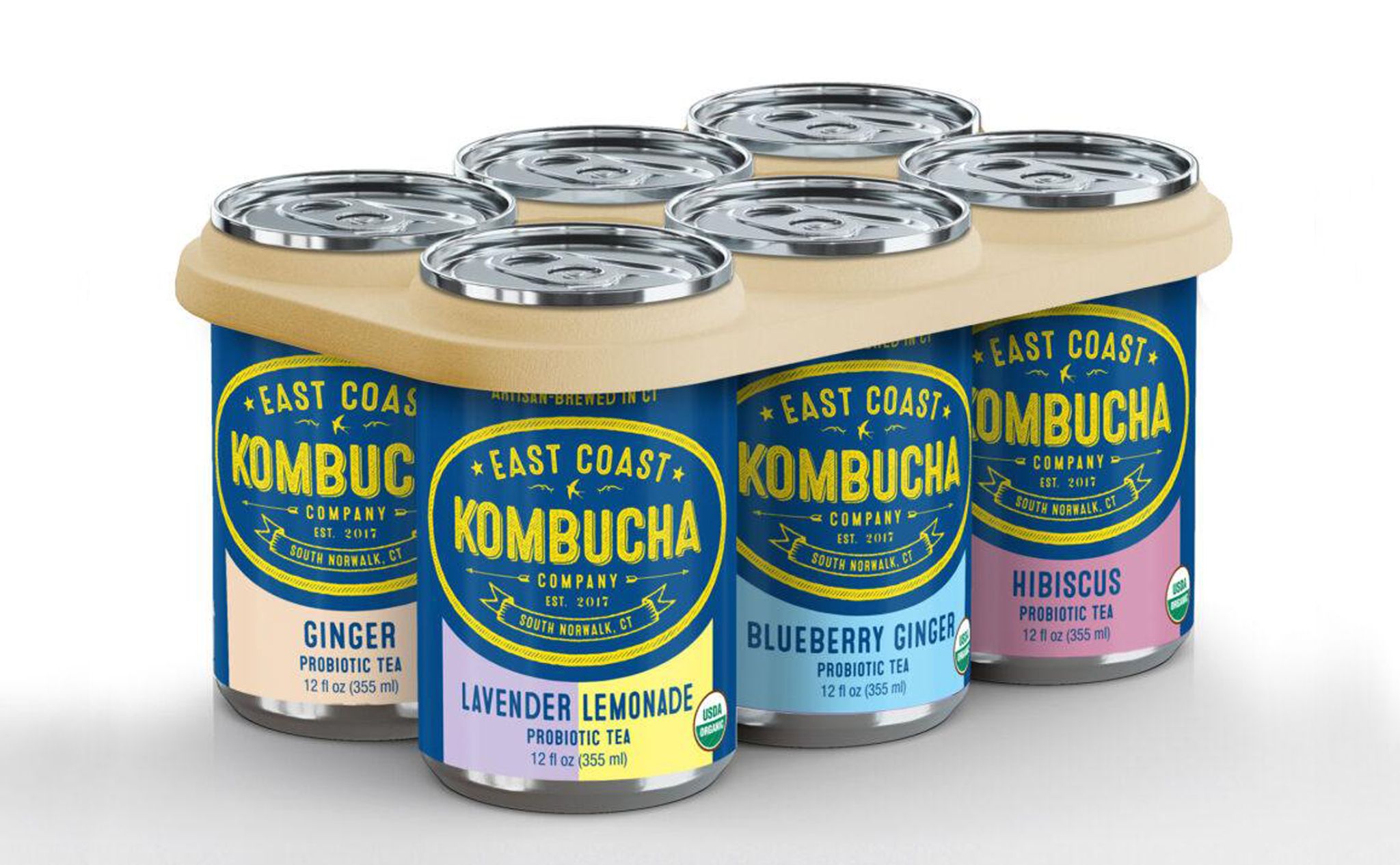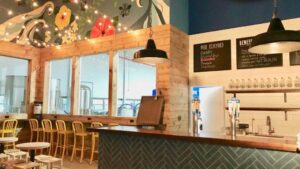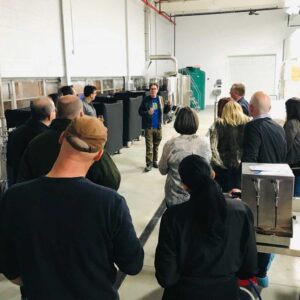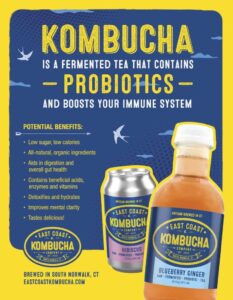Case Studies & Success Stories

East Coast Kombucha Company
 East Coast Kombucha Company, located in South Norwalk, is an artisanal-brewer of organic, probiotic-packed kombucha, which is fermented tea. Partners Steve Gaskin, Glynise Gaskin and Claudia Duvall are committed to brewing and distributing kegs, bottles and cans of the best-tasting kombucha available using only the finest ingredients (locally sourced whenever possible) – with a portion of their sales being donated to local charities. Their mission is to make a positive impact on their community, their customers’ lives, their employees, and on the environment.
East Coast Kombucha Company, located in South Norwalk, is an artisanal-brewer of organic, probiotic-packed kombucha, which is fermented tea. Partners Steve Gaskin, Glynise Gaskin and Claudia Duvall are committed to brewing and distributing kegs, bottles and cans of the best-tasting kombucha available using only the finest ingredients (locally sourced whenever possible) – with a portion of their sales being donated to local charities. Their mission is to make a positive impact on their community, their customers’ lives, their employees, and on the environment.
 The spectacular brewery and tap room is located in a historic textile factory built in 1903 – just steps away from the SoNo train station and a few minutes from The SoNo Collection shopping center. For decades, this building housed the Park-Kit Safety Equipment Company, which manufactured first-aid kits.
The spectacular brewery and tap room is located in a historic textile factory built in 1903 – just steps away from the SoNo train station and a few minutes from The SoNo Collection shopping center. For decades, this building housed the Park-Kit Safety Equipment Company, which manufactured first-aid kits.
The brewery and tap room are available for private parties and events, offering creative packages where guests can do private tastings and take a behind-the-scenes brewery tour. Free tours are offered every Saturday at 2:00 p.m. and take about 30 minutes. Visitors are invited to sign up and make a reservation in advance.
Co-Founder and CEO Steve Gaskin spills the tea on how East Coast Kombucha formed a fruitful, healthy business in Norwalk.
“I live in Weston, our business partner is from Wilton and so we knew we wanted a place relatively close to us. We really started looking at different spaces in 2017. We knew we needed to have a certain size. Then, as we progressed, we figured we would need a bit more space to build bigger and grow into it, as opposed to starting smaller and having to keep moving. So, we had a unique set of parameters for the space because it had to be a certain size for the amount of tanks that we have. The space also had to support the weight of the tanks when you put all that liquid in. So, you see there’s a lot of limitations. We were looking for kind of a needle in a haystack as it were. On top of that, we wanted a location to have a tasting room where we could interact with the community and make it a destination.
 We looked at a bunch of places on the I-95 corridor. As a manufacturer, being near the highway was important to us. Norwalk is good for us because of the location and the vibe. We like the history of Norwalk, all the past generations that have done what we do here. I’m from Detroit, so there’s a lot of that manufacturing history here that I like personally.
We looked at a bunch of places on the I-95 corridor. As a manufacturer, being near the highway was important to us. Norwalk is good for us because of the location and the vibe. We like the history of Norwalk, all the past generations that have done what we do here. I’m from Detroit, so there’s a lot of that manufacturing history here that I like personally.
I won’t lie. It’s been challenging with the pandemic and all. The good news is that we’re now in a lot more retail locations thanks to our sales rep, and we’re starting to see all the positives coming in from a growing company. We’re really happy with that. At the same time, there are still a lot of challenges with supply chain, pricing inflation and getting good staff.
We’re certified USDA organic. We buy as much of our ingredients locally as we can, as well as hire locally. We currently have five employees. It fluctuates during the summer with attending farmers markets and that type of thing. We are distributed primarily in Connecticut with a bit of distribution in New York and Massachusetts. We have a distributor helping us get into more locations. Most people are buying kombucha primarily in the grocery store. But deli is also a big market for us, especially with high-end delis around here. If you’re going to spend $14 on a nice sandwich, you don’t want to wash it down with a sugary soda. So, we’ve doubled our production and sales each year so far.
Our brand is really built on taste. Our big point of difference is that ours doesn’t have that vinegary taste a lot of people associate with kombucha. So, no matter how many times we say it and how many Instagram and Facebook posts we put out, unless people taste it, we’re just barking at them. So having an opportunity to get in front of them, hand them a cup and say ‘try it,’ that’s everything. Farmers markets are really good venues for that because we get a very targeted audience experiencing a nice, relaxing day and they’re looking for answers. We want to be the company that has answers for them.
 Our tasting room is another option. Getting people to come here and see the building. It’s such an incredible, amazing place to get excited about. Being able to show people this very unique production process that’s unlike anything else because you’re actually growing something. So, I think these things are the right combination. It’s a nice to have people come on a Friday or Saturday afternoon and experience something very different. And hopefully have them leave with something that’s going to help them with their life and promote better health and well-being.
Our tasting room is another option. Getting people to come here and see the building. It’s such an incredible, amazing place to get excited about. Being able to show people this very unique production process that’s unlike anything else because you’re actually growing something. So, I think these things are the right combination. It’s a nice to have people come on a Friday or Saturday afternoon and experience something very different. And hopefully have them leave with something that’s going to help them with their life and promote better health and well-being.
We formulated some of the original flavors in our basement and then branched off into other flavors. We still have some of the core flavors and then we try to rotate to seasonals, so that we always have six to seven offerings. The seasonals offer a little bit of variety to our consumers and the retailers like to have something different each month that they can rotate, and that sets us apart. The blueberry ginger flavor is our bestseller. That initial recipe has always been the same. Four months is the shelf life, as long as it’s refrigerated. It’s never going to spoil but it will keep fermenting over time and that could change the taste a little bit.
It all has to be refrigerated when sold. Obviously, that’s a challenge right there. We’re limited by the places that can take it because it’s even harder to get refrigerated space than shelf space. So we’re constantly fighting with other brands to get that little piece. We really try to go in and say, ‘Either you have a kombucha or you don’t. If you don’t, then give it a taste.’ We switched from bottles to cans during the pandemic, which was a good thing for us. Because at that point, most competitors were in bottles.
It’s an easier entry when retailers don’t know our brand for us to come in and say we’re local. And if they don’t have a kombucha, it’s easier for them to at least try it one time and gets us on the shelf. Once we get on the shelf, then people start trying it and then hopefully enjoy it and buy it more.
 The ideal kombucha consumer? That’s a good question. We’re really still trying to figure that out because it’s all over the place a lot of times. I think it skews a little bit more toward females 18 to 40. We have a lot of a lot of college-age women come in with their moms, and they say, ‘Hey Mom, try this!’ Then very health-conscious people who take care of their themselves. Kombucha is going to rebalance your gut system. It’s going to help with your immune system and it’s just going to detoxify you and hopefully make you feel better. Without the calories and without the artificial things.
The ideal kombucha consumer? That’s a good question. We’re really still trying to figure that out because it’s all over the place a lot of times. I think it skews a little bit more toward females 18 to 40. We have a lot of a lot of college-age women come in with their moms, and they say, ‘Hey Mom, try this!’ Then very health-conscious people who take care of their themselves. Kombucha is going to rebalance your gut system. It’s going to help with your immune system and it’s just going to detoxify you and hopefully make you feel better. Without the calories and without the artificial things.
Sometimes we’ll get people who are just looking for answers and they say, ‘I’ve been drinking soda all my life. My doctor said I need to change.’ Or, ‘I’ve heard something about it, let me try it.’ We have doctors, some trainers, a bike store setting up accounts. We have a lot of products in a big chain of gyms that have juice bars. That’s been a really good partnership. Places where they sell fish are also really good for us, because I think it’s that same demographic of people who are really conscious about what they put in their bodies.
It also makes an amazing cocktail mixer, and that’s a huge market for us as well. Plus, its’ nice to have Spacecat Brewing right next door. The brewing community has been really fantastic. It’s a real community of sharing ideas and equipment. It’s almost like this brotherhood/sisterhood of people just trying to make something that is not processed. And it’s kind of an old-school process when you look at it. A bunch of metal and clamps and hoses. It’s almost out of the 1800s, right? It’s an old-school manufacturing way that doesn’t use a lot of computers. You’re pumping in your liquids and you’re adding ingredients and then you’re letting nature do its thing. There’s something really special. We all take the same pride in our product and our processes and anytime that we can, we help each other.
We have a lot of regulars that come in every Saturday religiously. We love the customers. We love to talk to them. It’s so satisfying when people come in and they say, ‘I drink it every day, and it’s making me feel better.’ It’s really rewarding for myself and for my team who work so hard, just to get that one-on-one feedback. It personally energizes me.”
- Kumon Math and Reading Center of Norwalk March 20, 2023
- HMTX Industries November 7, 2022
- Datto October 17, 2022
- Snyder Group, Inc. September 22, 2022
- New England Fashion + Design Association September 16, 2022
- Get Joy September 13, 2022
- One Fun Company September 1, 2022
- East Coast Kombucha Company August 29, 2022
- Norwalk Conservatory of the Arts August 29, 2022
- Presbury & Associates June 8, 2022